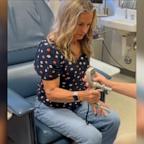Tulsa passengers try out TSA's full-body scanners
TULSA -- Here's a glimpse at the future of aviation security: Airline passenger Natalie Miller steps into a glass booth at a checkpoint. She raises her arms. Within moments, a screener asks what is in her back pocket.
Miller is puzzled because she dumped all of her possessions into a plastic bin before entering the booth. Or so she thought. When she reaches into her back pocket, she finds a credit card she left there.
"That's pretty cool," Miller says of the incident Thursday at Tulsa International Airport, shortly after the screener waved her through. "I thought the machines just detected metal."
Not anymore. The 35-year reign of airport metal detectors began its slow descent this week in Tulsa, where for the first time some passengers are skipping metal detectors. People are instead being screened in a 9-foot-high portal with glass shields that rotate to produce vivid pictures of what is underneath passengers' clothing.
The machines use electromagnetic waves to create pictures of energy reflected off people. The metallic-looking images show outlines of private body parts and blur passengers' faces. Two Transportation Security Administration (TSA) screeners in a closed room near the checkpoint view the images on computer monitors and relay information on radio headsets to checkpoint screeners.
The $170,000 body scanners could be installed at airports around the USA and would close a major security loophole by detecting non-metallic weapons such as plastic and liquid explosives. TSA testing shows the body scanners excel at finding hidden items as small as a plastic button, agency spokesman Christopher White said.
Now the TSA has more questions: How quickly do the scanners operate, and do passengers like them? And will they evoke more privacy concerns from critics who say the machines take security too far, because they can show the outlines of private body parts?
As the TSA expands its test for airports in San Francisco, Miami, Las Vegas, Salt Lake City and Albuquerque in coming weeks, it will be listening to passengers' reactions.




